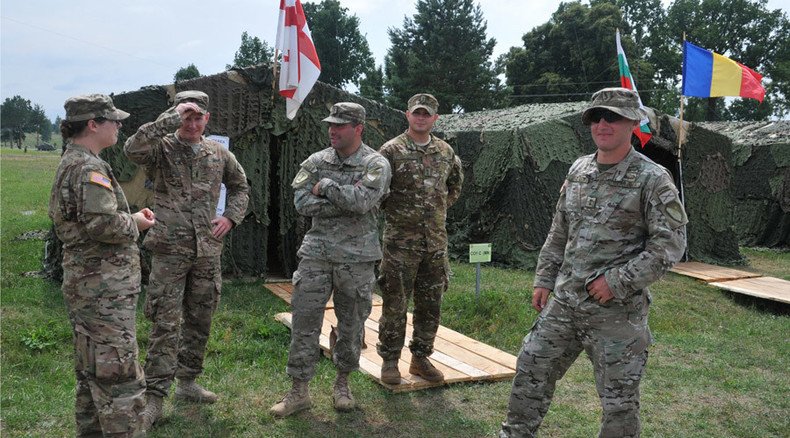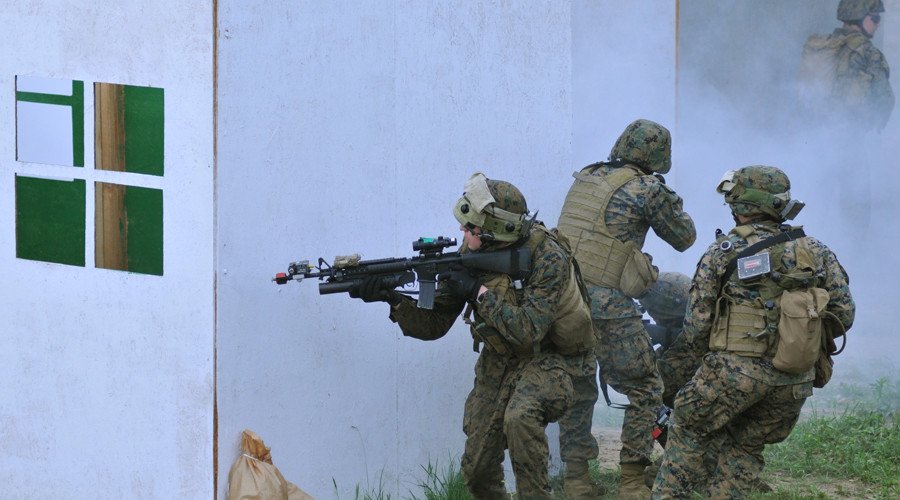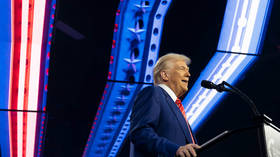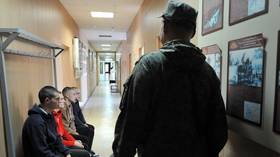‘What US fears is not troubled, but successful Russia’

The conflict in Ukraine is about US attempts to challenge and pressure Russia since Washington’s global policy is to try to undermine any country that is not a satellite of its power, says Michael Parenti, professor of political science at Yale University.
The US and NATO have started the largest airborne exercises in Europe since the end of the Cold War, with about 5,000 soldiers from 11 NATO countries taking part. These exercises are being conducted along as the conflict in eastern Ukraine escalates.
RT: What effect do NATO's war games have on the Minsk peace agreement in East Ukraine?
Michael Parenti: I think that NATO’s campaign in Ukraine is to weaken, to challenge and pressure Russia. That’s what they’ve been doing with a great deal of effort and that’s going on because the US policy globally has been to attack and to try to isolate and undermine any country that is not a satellite or potential satellite of US global power. It’s to make the world safe for the Fortune 500, it’s to make the word safe for multinational corporations and that’s what the struggle and conflict in Ukraine is all about.
And one of the things you do – you demonize the leader of the country that stands there as some kind of bulwark against you. To justify the intervention that they are perpetrating. The US leaders are demonizing Putin. Today in the US there are all sorts of people who have opinions about President Vladimir Putin. They don’t know a thing about him because there is nothing that is printed in our media about the statements, the suggestions, the overtures he has made. None of these things are publicized. It’s very difficult to find out what he is saying, what’s going on with Ukraine and Russia. What we are getting is a characterization that the Russians are aggrandizers and they have growing grasping plans to take over Ukraine. That’s simply not true. I don’t think Putin wants to in any way try to take over Ukraine. It would be too much of a headache and it’s not at all what he’s been doing.
But this thing of regime change is something that the US has used in country after country where you undermine the leadership, you bring in people, you give thousands of t-shirts all the same color, you give them banners and flags, food and money and little squads of snipers when that’s something to be done. Then you tell the American people that these people, this group – Noriega in Panama, Allende in Chile, Aristide in Haiti, Putin in Russia – they are hostile toward America and they threaten us. People feel threatened. Once you demonize the leader this gives you license to attack the country, or bomb it - in the case of Russia that would be too dangerous to do, thank God.
You have sanctions against the country, make life difficult for them. You say “Russia was aggressive, look at how it grabbed Crimea”. But they didn’t really. Crimea had belonged to Russia for over 240 years or so. It was taken away by a Soviet leader – Nikita Khrushchev who himself was Ukrainian and Crimea was given to Ukraine. When Crimea voted itself back as part of Russia, 93 percent voted in favor of returning to Russia and that’s where they belonged historically and ethnically and linguistically and also because the social programs and benefits would be better for them and they chose that. And the people in Eastern Ukraine are also trying to word off the Nazi incursions that are coming in, and Kiev bullying and the lie. So that’s my perspective of what is going on.

RT: NATO boasts that the "training has been adapted to the requests of Ukrainians.” Why do you think they're putting so much emphasis on the significance of this boot camp?
MP: I think what they fear is not a troubled Russia but a successful Russia. They fear any country whether it be China, Russia, Venezuela, Iraq under Saddam Hussein - who was not a hero and somebody to admire, he worked for the CIA. But when Saddam Hussein suddenly showed himself to be independent and wanting a larger part of the oil quota, when he refused to hand over the oil companies to the British and American petroleum companies, when he kept almost the entire economy state-owned and publicly owned, then the Americans started to find him very troublesome. They decided that he was somebody who was a threat to the US. He was not a threat to the US, but he was a threat to US corporate capitalism and that is something they could not tolerate. The Empire only has two types of people on its borders. It has either satellites who are potential enemies -I mean the satellites who are obedient and follow you - or enemies or potential enemies.
They fear Russia if it doesn’t cooperate and do what they want and doesn’t vote the way they want in the UN and accept the oil quotas that the US cartels put up. When those things happen, they are not bothered. But that isn’t what they tell the American people, they tell the American people that this man or that leader is hostile toward us, that he is almost like Hitler, he has secret weapons of mass destruction. These fantasy stories don’t go anywhere, they don’t tell anybody anything and that is what we are seeing today. Ukraine is just another little piece of puppetry in that direction. They have troops right on the Russian border in Latvia, Estonia, and Poland. Ukraine is not geopolitically crucial to American national security. If anything the threat is to Russia of course. It would be like Russian troops in Mexico, where would the Americans be? And they would be going hysterical, really worked up, wouldn’t they?
The statements, views and opinions expressed in this column are solely those of the author and do not necessarily represent those of RT.
LISTEN MORE:
The statements, views and opinions expressed in this column are solely those of the author and do not necessarily represent those of RT.












